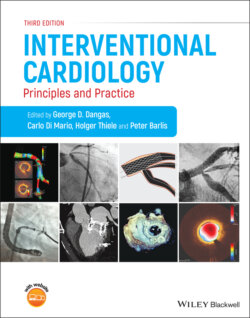Читать книгу Interventional Cardiology - Группа авторов - Страница 323
Glycoprotein (GP) IIb‐IIIa inhibitors
ОглавлениеThe three historically available GP IIb‐IIIa inhibitors are abciximab, a monoclonal antibody Fab fragment that is nonspecific, with tight receptor binding and slow reversibility, tirofiban, a small non‐peptide with rapid, selective and rapidly reversible blockade of the GP IIb/IIIa receptor, and eptifibatide, a small peptide, highly specific for the GP IIb/IIIa receptor, with a relatively low‐binding affinity and rapid dissociation from its receptor [68].
Unfortunately, the decision by its manufacturer to remove abciximab from production, has had the consequent effect of meaning the GP IIb‐IIIa inhibitor with the greatest weight of evidence behind it in terms of periprocedural administration [69,70] is no longer available. It should be noted that despite abciximab featuring in the many of the significant GP IIb‐IIIa trials, there is no evidence (as established by the FINESSE trial) to suggest that routine upstream treatment with abciximab in patients with STEMI improves outcomes compared to abciximab administered immediately prior to PCI [71]. Current options for GP IIb‐IIIa inhibition include either high‐bolus tirofiban (25 μg/kg) or eptifibatide (double bolus) and importantly all trials on GP IIb/IIIa‐inhibitors have been published before the widespread use of the more potent P2Y12 inhibitors prasugrel and ticagrelor.
The Prehospital initiation of tirofiban in patients with ST‐elevation myocardial infarction undergoing primary angioplasty (On‐TIME 2) study [72], was a multicenter, double‐blind, randomized controlled trial, with clopidogrel as a second anti‐platelet, which established that high‐bolus tirofiban improved ST‐segment resolution after PCI, but was not powered to assess clinical outcomes. A subsequent pooled analysis of the open‐label and double blind phases of the study revealed that major cardiac adverse events at 30 days were significantly reduced (5.8% vs 8.6%, p = 0.043) [73]. A more recent observational study in the contemporary era did not show greater efficacy of tirofiban vs control [74], albeit in a STEMI group with larger infarcts and more complex PCI, but established safety with no difference in MACCE (death, MI, stroke) or major/minor bleeding. There is also some emerging evidence that selective injection of tirofiban through a thrombus aspiration catheter, as opposed to IV tirofiban, may improve myocardial reperfusion in the case of a large thrombus burden [75].
Similarly for eptifibatide, early studies such as the Time to Integrilin Therapy in Acute Myocardial Infarction (TITAN‐TIMI 34) trial [76], established that early administration of eptifibatide in the ED before primary PCI yielded superior TIMI myocardial perfusion (compared to initiating eptifibatide in the cath lab) without an increasing in bleeding. In terms of direct comparisons with abciximab, the Eptifibatide Versus Abciximab in Primary PCI for Acute Myocardial Infarction trial (EVA‐AMI) [77], showed that in a cohort of 427 patients with STEMI treated with primary PCI, with the adjunct of either abciximab or eptifibatide, that there was no difference in terms of ST‐segment resolution at 60 mins, and although not powered for hard clinical endpoints, showed no difference in the combined endpoint of death, nonfatal reinfarction, and target vessel revascularization at six months. A retrospective observational study of the SCAAR registry suggested that eptifibatide is noninferior to abciximab in patients undergoing primary PCI with respect to death or MI at one year [78].
On the basis of the level of evidence available for GP IIb‐IIIa inhibitors at present, ESC guidelines recommend their use for “bailout” situations (i.e. no‐reflow or a thrombotic complication) only, not routinely in all cases of STEMI [3]. AHA guidelines make a class IIb recommendation for the “upstream” administration of GP IIb‐IIIa inhibitors, as well as a class IIa recommendation for their use at the time of primary PCI [4]. It should be noted that subgroup analyses have shown differential outcomes when patients are stratified by time from symptom onset, and significantly better outcomes are seen in those treated prior to 3 h from symptom onset [79].
